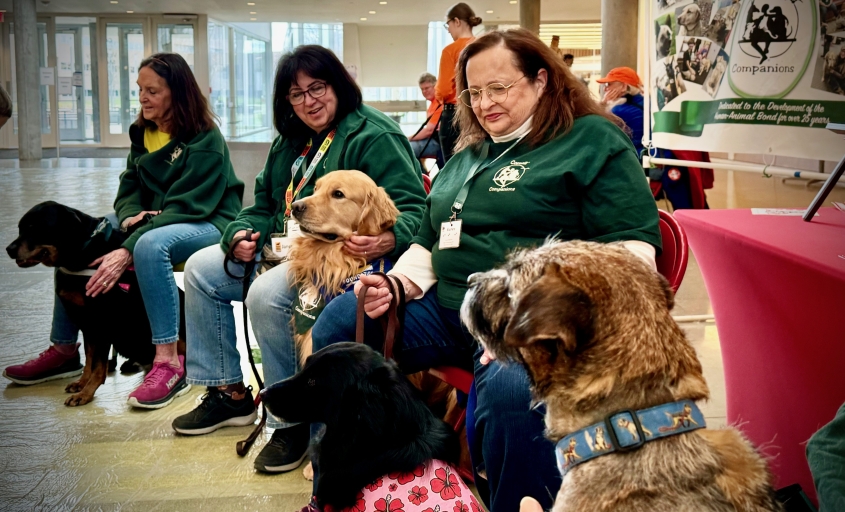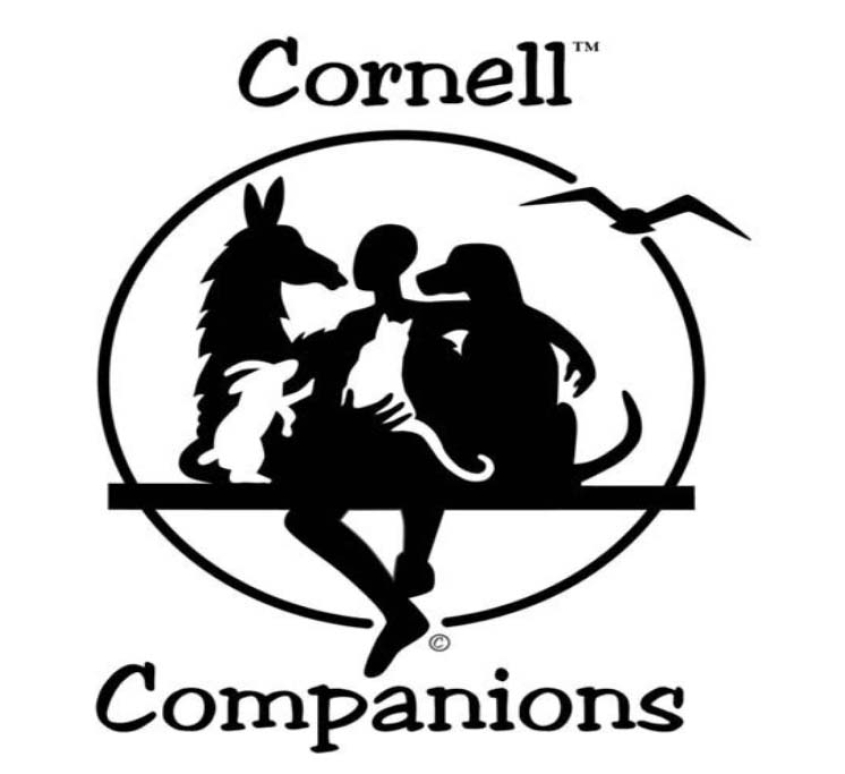Volunteering Information

Volunteering
General information
- Individuals interested in volunteering must take the handler training sessions, and the handler and pet must pass the Cornell Companions Therapy Dog Assessment or the other assessment for small animals, exotic or large animals. If you are interested in attending the handler training sessions and have your pet assessed, send an email to ccompanions@cornell.edu.
- If you and your animal pass the assessment, you will be asked to fill out the forms below. Please note these forms do not need to be submitted until after you complete the handler training and your pet has passed the screening.
For those who are interested but do not own their own animal, we always need help with the handler training, the pet assessments, social media, paperwork, team leaders. Send an email to ccompanions@cornell.edu.
We do not have a membership fee.
Cornell Companions Therapy Dog Assessment or other pet assessment
- Our dog assessments include skills tested in the AKC Canine Good Citizen (CGC) and the AKC Advanced Canine Good Citizen Community (CGCA) tests. We recommend that dogs have successfully complete a Beginners I and Beginner II level obedience classes before taking the assessment. In the meantime, sign up for dog training classes that provide socialization, manners, and basic obedience.
- For a dog, an AKC CGC evaluator from the Ithaca Dog Training Club will evaluate the skills, which include basic training skills such as walking on a loose leash, sit, down, stay and come on command. Dogs should be able to also walk through a loud crowd, handle a food distraction, get along well with other dogs and humans. The next Cornell Companions assessment is a Saturday morning in May 2026 (TBD), by appointment. Handler's Training (humans only) is the Thursday evening before the assessment April or May 2026 (TBD).
- Other animals such as goats, horses, llamas, as well as cats, rabbits and other small animals should be well socialized, and have a calm people-oriented temperament, as well as get along with other animals.
- Our evaluators will identify if the animal is ready or suited for Cornell Companions, and if more training is needed, provide suggestions. Handlers can have a total of three attempts at the screening with any particular animal.
- For those looking for local training classes, the Ithaca Dog Training Club (IDTC) offers a class twice a year (for a fee) that teaches the necessary skills found in the Cornell Companions Therapy Dog Assessment. **The next IDTC/CC offering will be in Spring 2026. Check out their website for details.
- Animals that do pass the assessment should submit their animal health form (see below). We will need the animal health completed yearly, this is usually done at the pet's annual exam with their veterinarian.
Animal requirements
- Dogs (and cats) must be at least one year old to participate.
- Pets must have been owned by the current owner for a minimum of six months to be eligible.
- Livestock animals may be able to participate, but the handler must be able to demonstrate that they can prevent or accommodate defecating and urinating when inside a facility. Some facilities may not approve of livestock animals visiting.
- Dogs that eat a raw diet or get raw treats cannot be a part of Cornell companions.
- A copy of the current rabies certificate is required for all animals except birds. The facility you visit will probably ask for a copy of the certificate too.
Handler requirements
Age minimum:
Handlers must be 18 years old to participate on their own. Children 13 years or older may participate with a parent/guardian who is also a Cornell Companions member. Please note that many facilities, including Hospicare and Longview, have their own guidelines on age limits.
Visitation:
Cornell Companions volunteers may only visit at established Cornell Companion partner facilities, and only at the times that have been specifically assigned.
Medical requirements:
Many facilities require COVID vaccination and a flu vaccination. Some require a TB test.
See our volunteers in action in this dog's-eye-view video of our Cornell Companions "in training" strolling across the Cornell University campus!



